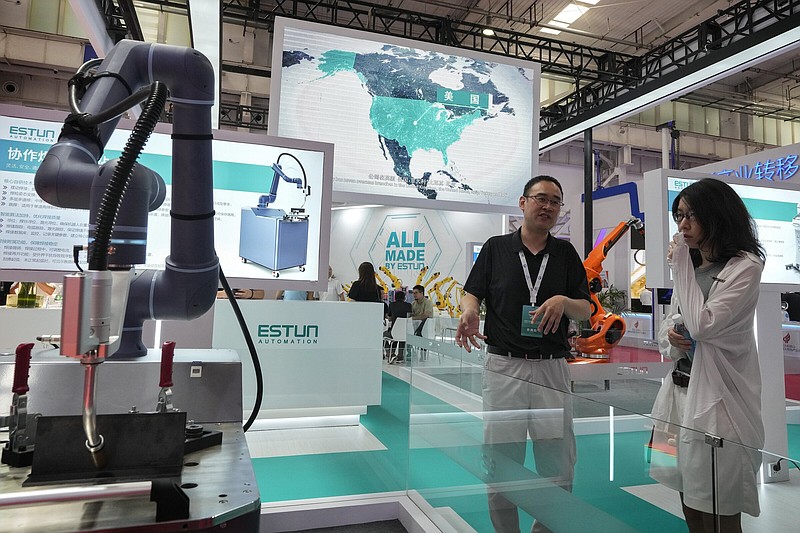BEIJING -- China says it would welcome a visit by U.S. Commerce Secretary Gina Raimondo after the imposition of foreign investment controls by her agency that have stung numerous Chinese companies.
Chinese Commerce Ministry spokesperson Shu Jueting did not offer a date, but said the countries are in "close communication on arrangements," according to reports Thursday.
Media have speculated that a visit could come as early as later this month. Raimondo last met her Chinese counterpart, Wang Wentao, in Washington in May to discuss trade.
President Joe Biden signed an executive order on Aug. 9 to block and regulate U.S. high-tech investment in China, reflecting the intensifying competition between the world's two biggest economies.
The order covers advanced computer chips, micro electronics, quantum information technologies and artificial intelligence.
Senior administration officials said the effort is related to national security goals rather than economic interests, and the categories it covers are intentionally narrow in scope. The order seeks to blunt China's ability to use U.S. investments in its technology companies to upgrade its military while also preserving broader levels of trade that are vital for both nations' economies.
Shu said China is conducting a "comprehensive assessment of the impact of the U.S. executive order" on U.S. foreign investment and will "take the necessary response measures based on the results of the assessment."
The United States and China are increasingly locked in a geopolitical competition with a conflicting set of values, including over Russia's invasion of Ukraine. However, with its economic growth sliding to 0.8% for the three months ending in June, China appears far more willing to engage with Raimondo than with defense officials and diplomats, whom it has fully or partly rebuffed.
Biden administration officials have insisted that they have no interest in economic "decoupling" from China, yet it also has limited the export of advanced computer chips and retained the expanded tariffs set up by former President Donald Trump.
In response, China has accused the U.S. of "using the cover of 'risk reduction' to carry out 'decoupling and chain-breaking.'"
China has meanwhile engaged in crackdowns on foreign companies, prompting a loss of confidence and the shifting of investment plans by global companies to other countries.
Calls by Chinese leader Xi Jinping and others for more economic self-reliance have left investors uneasy about their future in the state-dominated economy.
Xi has called for patience in a speech released as the ruling Communist Party tries to reverse a deepening economic slump and said Western countries are "increasingly in trouble" because of their materialism and "spiritual poverty."
Xi's speech was published by Qiushi, the party's top theoretical journal, hours after data Tuesday showed consumer and factory activity weakened further in July despite official promises to support struggling entrepreneurs. The government skipped giving an update on a politically sensitive spike in unemployment among young people.
Xi, the country's most powerful leader in decades, called for China to "build a socialist ideology with strong cohesion" and to focus on long-term goals of improving education, health care and food supplies for China's 1.4 billion people instead of only pursuing short-term material wealth.
Since taking power in 2012, Xi has called for restoring the ruling party's role as an economic and social leader and has tightened control over business and society. Some changes come at a rising cost as successful Chinese companies are pressured to divert money into political initiatives including processor chip development. The party tightened control over tech industries by initiating data security and anti-monopoly crackdowns that wiped out billions of dollars of their stock market value.
"We must maintain historic patience and insist on making steady, step-by-step progress," Xi said in the speech. Qiushi said it was delivered in February in the southwestern city of Chongqing. It is common for Qiushi journal to publish speeches months after they are delivered.
Economic growth slid to 0.8% in the three months ending in June compared with the previous month, down from 2.2% in January-March. That is equivalent to a 3.2% annual rate, which would be among China's weakest in decades.
A survey in June found unemployment among urban workers aged 16 to 24 spiked to a record 21.3%. The statistics bureau said this week it would withhold updates while it refined its measurement.
China's government is also trying to reassure jittery homebuyers after a major real estate developer missed a payment on its multibillion-dollar debt, reviving fears about the industry's shaky finances and their effect on the struggling Chinese economy.
There is no indication Country Garden's problems might spread beyond China, which seals off its financial system from global capital flows, economists say. But they highlight the industry's struggle under pressure from the ruling Communist Party to reduce soaring debt that is seen as an economic threat. That has bankrupted hundreds of small developers and depressed China's economic growth.
The Country Garden episode has echoes of Evergrande Group, which is trying to restructure more than $340 billion owed to banks and bondholders. Fears of a possible Evergrande default in 2021 rattled global markets, but they eased after the Chinese central bank said its problems were contained and Beijing would keep credit markets functioning. A central bank official said in March financing conditions have "improved significantly."
Financial markets were rattled when Country Garden Holdings Co. missed two payments totaling $22.5 million owed to buyers of dollar-denominated bonds on Aug. 6. It has a 30-day grace period before it would be declared in default.
A government spokesperson tried to reassure the public and financial markets, saying conditions are improving and regulators are getting debt under control.
"The risks of housing enterprises are expected to be gradually resolved," said Fu Linghui of the National Bureau of Statistics.
Information for this article was contributed by Joe McDonald and Ng Han Guan of The Associated Press.

